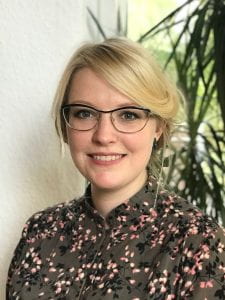 Irina Kalinka is currently a fifth-year Ph.D. student in the Department of Modern Culture and Media at Brown University. Kalinka holds a B.A. in Politics & Human Rights from Bard College, N.Y., and an M.A. in English Literatures from Humboldt University, Berlin. Her previous work experience includes being a research assistant at the YIVO Institute for Jewish Research in New York City, developing digital climate science communication at the Institute for Advanced Sustainability Studies in Potsdam, and serving as an elected county-council representative for the Green Party in Teltow Fläming, Germany. During the 2021-22 academic year, she will join the Cogut Institute for the Humanities as a graduate fellow. Her research interests include platform studies, communicative capitalism, political subject formation, and digital geographies, infrastructures, and architectures.
Irina Kalinka is currently a fifth-year Ph.D. student in the Department of Modern Culture and Media at Brown University. Kalinka holds a B.A. in Politics & Human Rights from Bard College, N.Y., and an M.A. in English Literatures from Humboldt University, Berlin. Her previous work experience includes being a research assistant at the YIVO Institute for Jewish Research in New York City, developing digital climate science communication at the Institute for Advanced Sustainability Studies in Potsdam, and serving as an elected county-council representative for the Green Party in Teltow Fläming, Germany. During the 2021-22 academic year, she will join the Cogut Institute for the Humanities as a graduate fellow. Her research interests include platform studies, communicative capitalism, political subject formation, and digital geographies, infrastructures, and architectures.
Concept: User Democracy
Contemporary debates about the political impact of digital platforms in the West often revolve around a central, limiting dichotomy: Does digital media revitalize or hurt democracy? This project shifts the focus to show how digital platforms are not only facilitators — of both democratic and anti-democratic tendencies — but also engender their own normative conceptualization of democracy. This includes defining what information is in the public interest, what constitutes “healthy” public discourse, and what are good citizenship practices and pedagogies. What emerges from such efforts is a political imaginary I call “User Democracy.”
User Democracy is informed by a technocratic understanding of politics, including the valorization of data and automation, predictability, and systematization. Community and popular sovereignty are here imagined as operational and, thus, potentially programmable, which devalues the need for political contestation, inherent in questions of history, justice, and equality, to play out in a truly public setting. Instead, digital public life is facilitated for political subjects through the ‘service’ of interface-design, algorithmic filters, or user manuals. Under this framework, democracy is seen as a project of optimization and management, not common struggle. Subjects are encouraged to imagine themselves as ‘citizen-users’ in the service of digital public space, where citizenship is an improvable and quantifiable skill — instead of a shared responsibility.
My project asks how to resist such reductionist conceptions of collective world-making. It argues against a depoliticized understanding of democracy and instead emphasizes a counter-approach rooted in the political ethos of (digital) agonism, which emphasizes that popular sovereignty is not an object to be facilitated from above, but a continuous, collective process of struggle around what it means to be in common with others.